
Senator Flanagan Supports Effort To Address Growing Heroin and Opioid Epidemic
John J. Flanagan
June 20, 2014
-
ISSUE:
- Controlled Substances
Senator John Flanagan (2nd Senate District) recently joined with his colleagues in the New York State Senate to pass legislation to address issues surrounding the increase in heroin and opioid abuse, addiction, and related crimes in New York.
“As our communities continue to fight the epidemic of drug abuse, it is imperative that our state take immediate steps to help them win that fight. This is a growing problem that is impacting more of our families every day. This fact was driven home repeatedly during the task force hearings and in every discussion we have with parents across New York State,” stated Senator Flanagan. “I look forward to the Assembly acting on these bills quickly in order to combat this troubling and growing problem.”
In March 2014, New York State Senate Majority Coalition Co-Leaders Dean Skelos and Jeffrey Klein created the Joint Task Force on Heroin and Opioid Addiction to examine the alarming rise in use of heroin and opioids that has claimed lives and hurt families across New York State. The task force report released last month proposed a package of bills to target the prevention, treatment, and enforcement issues raised during extensive testimony provided by dozens of experts, parents, and concerned New Yorkers during 18 forums held throughout the state.
Task force forum participants examined the issues surrounding the increase in drug abuse, addiction and drug related crimes; solicited input from experts and other stakeholders; and developed recommendations that were used to create a comprehensive package of legislation to address these issues.
The task force recommendations are very similar to, or complement all of the bills passed today, which include:
Preventing Opioid Abuse and Overdoses
- Increasing public awareness (S7911): Requires the Office of Alcoholism and Substance Abuse Services (OASAS) and the Department of Health (DOH) to establish the Heroin and Opioid Pain Addiction Awareness and Education Program. The Program would utilize social and mass media to reduce the stigma associated with drug addiction, while increasing public’s knowledge about the dangers of opioid and heroin abuse, the signs of addiction, and relevant programs and resources.
- Establishing school drug prevention programs (S7910): Allows for age-appropriate information about the dangers of illegal drug use to be added to junior high school and high school health class curriculums.
- Increasing the effectiveness of overdoses prevention (S7905): Provides that naloxone kits distributed through an opioid overdose prevention program must include an informational card with instructions on steps to take following administration, as well as information on how to access addiction treatment and support services. Opioid overdose prevention programs provide those at risk of an overdose, their family members and their friends with naloxone kits and training on proper administration.
Increasing the Availability and Efficacy of Addiction Treatment
- Creating a new model of detoxification and transitional services (S7904): Establishes the Opioid Treatment and Hospital Diversion Demonstration Program, requiring the development of a new model of detoxification and transitional services for individuals who are in of need support but may not need serious medical care, therefore reducing reliance on emergency room services.
- Establishing a relapse prevention demonstration program (S7903): Creates a Wraparound Services Demonstration Program, through which OASAS would provide referral services for individuals both during participation in substance abuse treatment programs and for nine months thereafter. These community supports, access to which is intended to prevent a relapse, include case management services addressing educational resources, legal services, financial services, and childcare services; peer-to-peer support groups, social services; family services; employment support; and transportation assistance.
- Enabling parents to seek services for children suffering from substance abuse (S7909): Provides that a minor child alleged to be suffering from a substance use disorder may receive an assessment for such disorder as part of the Person in Need of Supervision (PINS) diversion services and may access a variety of services through the PINS diversion process.
- Promoting the affordability of substance abuse services (S7912): Requires insurers to comply with federal substance abuse parity laws, strengthens and standardizes the utilization review process for determining insurance coverage for substance abuse treatment disorders, and requires insurers to continue to provide and reimburse for treatment throughout the appeals process.
Providing Additional Resources to Law Enforcement
- Assisting Health Department Bureau of Narcotic Enforcement Investigators (S7906): Authorizes the Department’s Bureau of Narcotic Enforcement (BNE) investigators to directly access criminal histories of individuals suspected of criminally diverting prescription medications.
- Adding Fraud and Deceit of Prescription Medication to Penal Law (S7907): Creates a new crime in the penal code of “fraud and deceit related to controlled substances” to crack down on doctor shopping, criminalizing behavior by those individuals who obtain or attempt to obtain a controlled substance or a prescription by misrepresenting themselves as a doctor or pharmacist, or presenting a forged prescription.
- Creating the criminal offense of “criminal sale of a controlled substance by a practitioner or pharmacist” (S7902): Creates a new crime in the Penal law - a Class C felony - when a practitioner or pharmacist uses his or her professional practice to unlawfully sell controlled substances.
- Making the "criminal sale of a controlled substance by a practitioner or pharmacist" offense eligible for prosecution under the enterprise corruption statute (S7908) and allows for eavesdropping warrants, both tools for investigations into the illegal distribution of controlled substances.
In addition to the bills passed, the Senate passed legislation (S6477B) to increase the use of the heroin antidote naloxone, which can be used to treat heroin overdoses onsite. By authorizing health care professionals to issue non-patient specific prescriptions for such medication to certified training programs and pharmacies, this bill would increase the number of people who have naloxone when it is needed most.
All components of the package have been passed by the Assembly and will be sent to Governor Andrew Cuomo for approval.
Share this Article or Press Release
Newsroom
Go to NewsroomBoater Safety Information
May 15, 2019

2019 Memorial Day Guide
May 13, 2019


